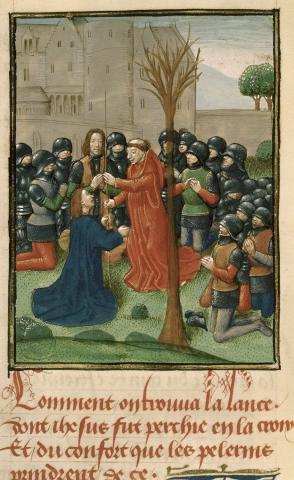Kerbogah Tries to Retake Antioch
[9.25.1] Erat autem ibi quīdam peregrīnus dē nostrō exercitū cui nōmen Petrus, cui, antequam cīvitātem intrārēmus, appāruit sānctus Andreās apostolus dīcēns: “Quid agis, bone vir?” Cui ille respondit: “Tū quis es?” Dīxit eī apostolus: “Ego sum Andreas apostolus. Agnōscās, fīlī, quia, dum vīllam intrāveris, vādēns ad ecclēsiam beātī Petrī, ibi inveniēs lanceam salvātōris nostrī Iēsu Chrīstī, ex quā, in crucis pendēns patibulō, vulnerātus fuit.” Haec omnia dīcēns apostolus, continuō recessit.
[9.25.2] Ipse autem, timēns revēlāre cōnsilium apostolī, nōluit indicāre nostrīs peregrīnīs. Aestimābat autem sē vīsum vidēre. Et dīxit ad eum: “Domine, quis hoc crēdiderit?” In illā vērō hōrā accēpit eum sānctus Andreas, et portāvit eum usque ad locum ubi lancea erat recondita in terrā.
notes
vocabulary
9.25.1
patibulum –ī, n: gibbet, cross (for crucifixion)

